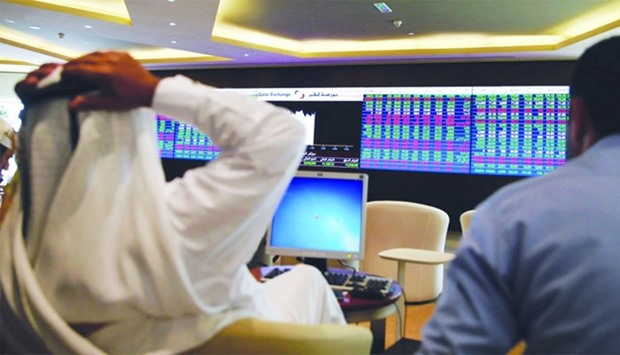Foreign institutions continued to be net buyers but with a lesser vigour, which rather dragged the Qatari bourse during the week which saw QNB report more than 7% growth in net profit in the first three months of this year.
The 20-stock Qatar Index plummeted 2.04% during the week which saw Moody’s, a global credit rating agency, view that Qatar's new insurance regulation will enhance reserve adequacy and improve underwriting profitability; even as implied additional compliance costs may set the tone for consolidation among some smaller players.
In comparison, Muscat bourse gained 2.6%, Dubai (0.91%), Saudi Arabia (0.56%) and Kuwait (0.03%); while Bahrain and Abu Dhabi fell 1.23% and 0.88% respectively during the week which saw Capital Intelligence, the international credit rating agency, affirm QIIB's financial strength rating at ‘A-’ and the long-and short-term foreign currency ratings ‘A-’ and ‘A2’, respectively with positive outlook.
QSE has fallen 2.54% year-to-date against a plunge of 9.46% in Saudi Arabia, 8.11% in Bahrain and 6.85% in Kuwait; whereas Dubai, Muscat and Abu Dhabi gained 7.46%, 3.76% and 1.03% respectively.
Opening the week weak at 10,252 points, the QSE kept sliding for the next two days to touch a low of 10,009, showing signs to sink below the 10,000 mark. However, hopes of an agreement among Organisation of the Petroleum Exporting Countries (Opec) and non-Opec members strengthened the global oil market, which had its reflection for the next days and the index gained and settled at 10,165 points on Thursday.
Robust buying interests were seen particularly in the industrials, real estate and banking counters during the week which witnessed a report from Bank of America Merrill Lynch that said the implementation of output freeze is likely to face headwinds but may open the door for further negotiations as Opec and non-Opec members meet here on April 17.
Weakened profit booking by local and non-Qatari retail investors as well as domestic institutions also helped maintain positive rally in the QSE during the week which saw Global Investment House view that the 40% cut in the GCC roaming charges is expected to be "negligible" for the telecom service providers in the region but will lead to increase in the use of roaming services.
Islamic stocks witnessed faster declines than the conventional ones during the week which saw Boston Consulting Group find that the GCC petrochemical industry, which risks of losing is competitive advantage amid massive market disruptions, could strengthen the operational efficiency through which it can enhance earnings by 10% to 30%.
The 20-stock Total Return Index shrank 2.04% and All Share Index (comprising wider constituents) by 1.88% and Al Rayan Islamic Index 2.36% during the week which saw trading turnover and volumes on the decline.
Industrials stocks shrank 3.05%, realty (2.18%), banks and financial services (1.98%), telecom (1.09%), consumer goods (0.73%) and transport (0.59%); while insurance gained 0.65% during the week which saw banking, industrials, real estate and consumer goods stocks constituted more than 81% of the total trading volume.
Market capitalisation tanked 1.87% to QR543.65bn with large, mid, small and microcap equities melting 2.08%, 1.97%, 1.58% and 0.58% respectively during the week which saw Commercial Bank expecting to raise further funds from the market by the end of third quarter of this year.
Large cap equities have fallen 4.82% year-to-date; whereas small, micro and midcaps gained 2.79%, 1.32% and 1.28% respectively during the week which saw Qatari Investors Group (QIG), Masraf Al Rayan and Gulf Warehousing (GWC) dominate the trading in volume and value.
Nine each of the 12 banks and financial services; eight of the nine industrials; six of the eight consumer goods; all the four real estate; and two each of the five insurers, the three transport and the two telecom stocks closed lower during the week.
About 78% of the stocks were in the red with major losers being QIG, Barwa, Industries Qatar, Gulf International Services, Mesaieed Petrochemical Holding, Aamal Company, Mazaya Qatar, United Development Company, Qatar Islamic Bank, Masraf Al Rayan and Medicare Group; whereas GWC, Widam Food, al khaliji, Qatari General and Reinsurance and Medicare Group bucked the trend during the week.
Foreign institutions’ net buying weakened perceptibly to QR162.7mn compared to QR212.77mn the week ended March 31.
However, domestic institutions’ net profit booking fell to QR71.91mn against QR76.09mnn the previous week.
Local retail investors’ net selling declined substantially to QR74.46mn compared to QR113.4mn the week ended March 31.
Non-Qatari individual investors’ net profit booking decreased to QR16.49mn against QR23.27mn the previous week.
Total trade volume fell 12% to 42.39mn shares and value by 8% to QR1.7bn but transactions grew 4% to 26,719 during the week.
The telecom sector saw 43% plunge in trade volume to 3.23mn equities, 44% in value to QR91.13mn and 31% in deals to 2,733.
The real estate sector’s trade volume plummeted 32% to 7.06mn stocks, value by 37% to QR159.63mn and transactions by 20% to 3,083.
The market witnessed 17% shrinkage in the industrials sector’s trade volume to 8.84mn shares but on 2% gain in value to QR468.24mn and 17% in deals to 6,698.
The banks and financial services sector’s trade volume tanked 10% to 12.67mn equities, value by 24% to QR476.49mn and transactions by 4% to 6,734.
The transport sector reported 4% fall in trade volume to 4.06mn stocks but on 17% rise in value to QR206.51mn and 15% in deals to 2,871.
However, the consumer goods sector’s trade volume more than doubled to 5.91mn shares and value also more than doubled to QR268.94mn on 91% expansion in transactions to 4,085.
The insurance sector saw 5% jump in trade volume to 0.61mn equities, while there was 24% decline in value to QR29.15mn and 11% in deals to 515.
In the debt market, there was no trading of treasury bills and government bonds during the week.

